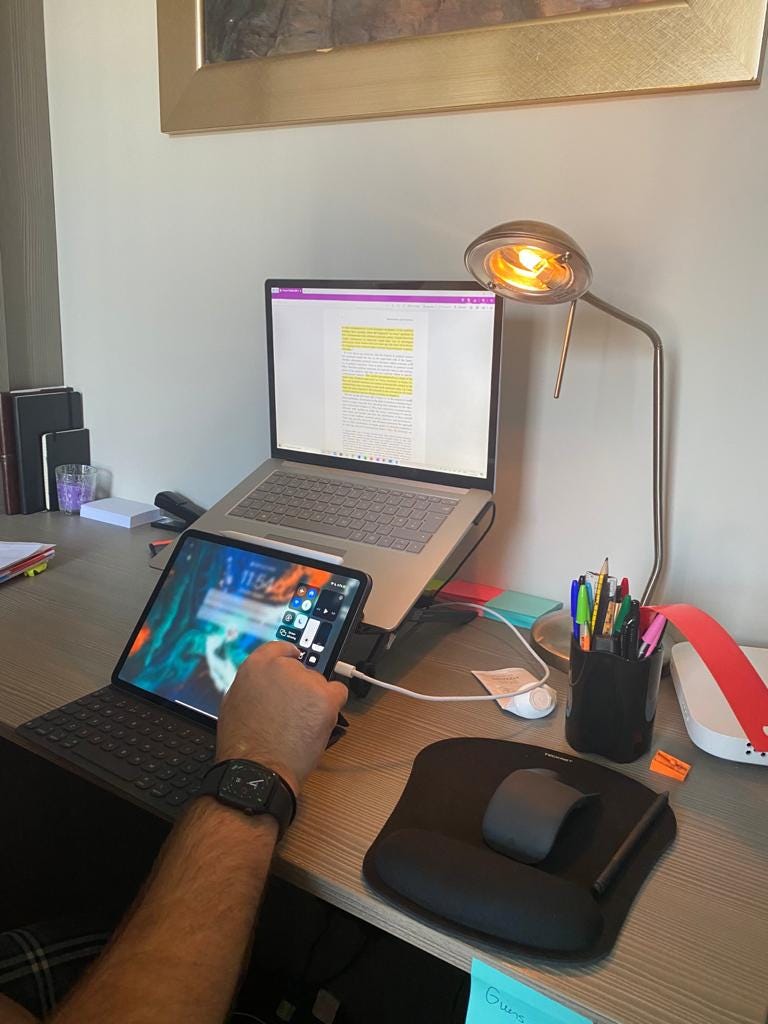What life after university is like
A look at the main changes I have noticed ~1 year after graduating.
Hello party people! We are back with some introspection and a look into some of the differences I have noticed between life during and after university.
If you haven’t already, I’d encourage you sign up so you get these articles directly into your inbox. And if you have signed up, spread the word!
Around this time last year I was in full-flow preparation for my university finals. They were somewhat of a dead-rubber as I secured my 2:1 already and a first would've required a herculean effort. This might have been possible in normal circumstances but with COVID upending our lives, it put it out of reach. Now with the anniversary of me finishing university coming up it has made me stop and reflect on the difference between life during and after university. When I speak to university students I don't envy their position and have developed a form of mental fog as I genuinely can’t tell you how I got through my three years. With that being said I wanted to talk about some of the main differences I have noticed between the two. Although you should bare in mind this is dependent on context: I started work relatively soon after graduating and have worked from home since.
Less free-time but better quality.
As I spoke about in a previous piece, at university your timetable is very sparse. The scheduled hours you have are very limited which means you have a lot of "free-time". This means long lunches, early finishes and ad-hoc days off can be the norm. This contrasts to working life in which you have to get up and work roughly the same hours everyday. On a Friday you might log-off at the stroke of 5pm but that is as good as it gets in terms of reclaiming time. So your only free-time are the evenings and weekends.
But having said that, that free-time is so much more liberating compared to the pseudo free-time you have at university. There's an adage I would use: given you have a tonne of free-time at university, you have no free-time. There is always more you can do with respect to university reading and work. So when you come home in the evening from a day of university, you still have a list of tasks in your head that you could do. And that list will never end until the summer holidays which is really the only "authentic" break you get. Contrast to working life, when you log-off for the day you are done. There isn't a list of things you "could" be doing that evening, there is only the tasks for tomorrow. There also isn't the infinite pursuit of knowledge that are you undergoing at university so you aren't guilty when you go about your leisure activity. My evenings and weekends are filled with so much "stuff" - much more than I did at university - but I enjoy it so much more because there isn't the spectre of another Journal of Democracy article looming. In short, at work there is a clearer demarcation of what is “my” time vs what is “work” time.
Another point is that I guard my free-time a lot more. I'm a lot more thoughtful about how I use my time and attention given it is so limited. I have found this has had positive effects as I devote more time to the things I enjoy AND that have some positive pay-off i.e. mentoring, writing, reading, running, and spending time with my family.

Living more day to day.
When you're studying, everything is in relation to another period of time. You do reading X for class next week, study for exams in May/June, etc etc. So your mind is always on the future. There are discrete, tangible changes that will take place at specific points in time. First year ends on day X, second year day Y, graduation day Z, apply for internships in second year, get a grad scheme before the deadlines end blah blah blah. Essentially, your whole time is geared towards the day you graduate and get to wear the cap and gown.
At work it is the opposite. The transitions are too vague or too uncertain to look forward to. I'm not exactly counting down the days until I become an Associate as its not such a significant change as e.g. graduating. So this has the potential to become quite depressing as there isn't something to look forward to built into the working experience. At the start I struggled to cope with this mentality shift. Over-time I have learnt to live in the moment and have small things to look forward to. I no longer need the big El-Dorado at point X in time to get me through any particular phase. Instead I look forward to smaller things. Back in Winter it was recovering from COVID and getting back to running, then it was looking forward to my Nintendo Switch arriving and playing Pokémon Shield. Now I'm looking forward to meeting my new baby cousin once the restrictions are lifted and after that I'll be looking forward to Ramadhan. And I'm sure after that there'll be something similarly banal to look forward to. In short, I'm just living moment to moment and truth be told I am a lot happier. There is no grand vision of what life will be like in 3-5 years, which means I cant project my happiness onto that point in time. Instead I have to work on my mental well-being on a day-to-day level. And this means I end up actually working on it because I have to, there's no "rosy future" waiting for me.
You have to make your own future.
As I mentioned briefly, there is no grand 3-5 year plan. So technically, there is no future other than a vague plan for retirement (although with the way the world is going our generation might not retire). All the changes you make are of your own volition. Assuming a perfect world in which you aren't made redundant, any changes you make have to be driven by you. Contrast to the time at university, as I said before, there are changes built into the experience. So this can either be incredibly liberating or frustratingly constricting. You're either the captain of your life or stuck. Again, you have to decide what to do. For me this has meant deciding where I want to roll-off full-time when my graduate scheme ends and what qualifications to pursue alongside work. On the one hand I feel very in control and can steer my life in any direction I want, but at the same time the amount of control often means I end up feeling like I have zero control. Barry Schwartz highlighted the paradox of choice i.e. how too much choice leads to a suboptimal outcome.
The other side to all this is you have to have a get-up-and-go attitude towards things. Any extra stuff, both in work and outside, is driven by you. As an example I recently started Urdu classes and this requires a lot of effort. Showing up to my weekly classes is the easy part, most of the learning is facilitated by me through practise and all the homework I do. I cant really do this half-arsed as I decide to undertake the class myself. It wasn't compulsory, no one cares if I do or don't do it, its all for my own benefit. I don't believe in the whole 'forcing yourself to do incredibly uncomfortable things to build experience' philosophy but undertaking these extra things has helped me build a more get-up-and-go attitude as opposed to going with the flow.
So in summary, my time is more restricted but better, I live more day to day and I'm much happier for it, and the future becomes this great big chasm. So far those are the big changes I have noticed. The only thing I deliberately kept off is how great it is to be earning a salary and not be stressed about money. I kept this off because I haven't moved to London yet so my perspective might change. I will be sure to come back and update this article once I have had enough experience of working life as a renter. It’s also hard to comment on social life due to COVID so all the more reason to revisit this at a later point. Overall, so far, I much prefer working life.
As always, I welcome your thoughts and perspectives. For any graduates who have been out of university a few years longer I would be keen to hear your thoughts on what I have said and if there are any further changes around the corner!






Good article. It's been 4 years down the line now (and you've been promoted so obviously you've done the right things), so I wonder if you still agree with these points you've made? Would be great to see a follow-up article.